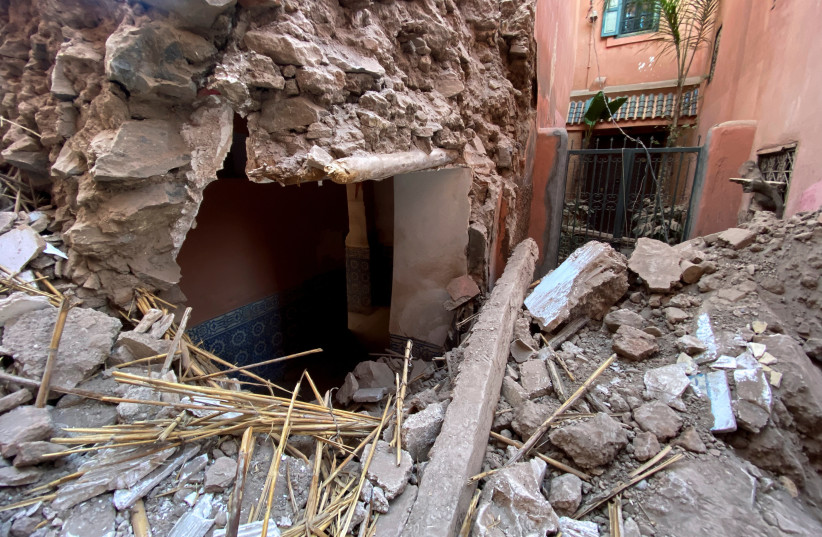Israel may soon witness similar scenes to the devastating ones seen in Morocco due to the government’s failure to prepare for an earthquake, which experts predict could happen here.
This sobering message was delivered by State Comptroller Matanyahu Englman in a video address on Sunday.
“Six months ago, it was Turkey,” he said. “On [Friday], Morocco faced a fatal earthquake. The State of Israel continues to neglect earthquake preparedness despite these stark reminders. Instead of waiting for an investigative committee after a catastrophe, it is imperative that the prime minister and the pertinent ministries promptly address the country’s shortcomings.”
Why will Israel face a devastating earthquake?
Israel is located at the juncture of the African and Arabian tectonic plates and, therefore, faces an elevated seismic threat. The African plate is split along a north-south axis known as the “Dead Sea,” or Syrian-African,” Rift, which extends from southern Turkey through Syria, Lebanon, the Jordan Rift Valley, the Arabah Valley, the Gulf of Aqaba, the Red Sea, and southward along the eastern coast of Africa. Regions closest to these rift zones are particularly susceptible to significant earthquakes.
According to Dr. Ariel Heimann, a senior researcher at the Institute for National Security Studies and a geologist, earthquakes along the Syrian-African Rift in Israel can be traced back as far as the eighth century and have occurred around every 80 years. The last major quake of magnitude six or higher was in 1995 in the Eilat region. It did not cause devastation because it struck south and not north of Eilat in the Dead Sea resort region.

Many small earthquakes that are barely felt occur in the region regularly and pass without incidence. Nevertheless, assuming a high likelihood of another strong quake between southern Lebanon and the southern Dead Sea within the next 50 years is reasonable, Heimann said.
"An earthquake of significant magnitude in Israel is not a question of 'if' but 'when.'"
Dr. Ariel Heimann
“An earthquake of significant magnitude in Israel is not a question of ‘if’ but ‘when,’” he said. “The disaster in Morocco serves as another warning sign for Israel. Such an earthquake, or perhaps even stronger, is only a matter of time.”
The next earthquake could be 10 minutes [or] 10, 20, or 50 years away, Heimann said, adding that even with all the new technology, there is no way to predict an earthquake.
“Unlike threats controlled by humans, such as the Iranian threat, Hezbollah, or internal rifts, an earthquake is uncontrollable, and the critical issue is preparing for it to minimize its damages,” he said.
Most politicians hope and believe “it won’t happen in their term,” Heimann said. As such, they tend to talk about earthquake preparedness and form committees but take little swift action, he said.
“There are things that are being done, but too slowly and hopefully not too late,” Heimann told The Jerusalem Post.
A State Comptroller’s Report released in the spring evaluated the earthquake readiness of five municipalities located along the Syrian-African Rift: Beit She’an, Tiberias, Safed, Kiryat Shmona, and the Hatzor Haglilit Local Council. The report presented a picture of failure over many years in the country’s preparedness for an earthquake.
In his address on Sunday, Englman highlighted two data points from that report. He said 93% of buildings in the periphery and 70% of schools that are in need of reinforcement have not been reinforced.
The data is even more striking when the cost of reinforcement in addition to the mitigation of buildings in the five local authorities that were examined is only about NIS 2.34 billion, he added.
Heimann emphasized the need for swift measures, including exercises, long-term planning, and implementing a short-term warning system. He identified three critical priorities: reinforcing public and private structures, educating the population, and establishing an authoritative entity with a substantial budget to oversee preparedness in advance, as well as managing the aftermath of an earthquake.
“Unfortunately, we do not currently have such an entity, and the subject is undefined and scattered,” Heimann said.
Dr. Dorit Nitzan, director of the Master’s Program in Emergency Medicine at Ben-Gurion University of the Negev’s School of Public Health, said training must be established on a community level. People should be educated on how to serve each other in case emergency personnel have trouble gaining access, she said.
Home Front Command offers resources for preparing for such a disaster, including how to reinforce your own home and what to store at home, such as food, water, and batteries.
Some 800,000 people died due to earthquakes worldwide between 1990 and 2018, Englman wrote. The annual average of the total financial damages caused by earthquakes worldwide between 1990 and 2018 was about $34.5b.
“People are going to die,” said Nitzan, who formerly served as the regional emergency director for the European Region of the World Health Organization and has her share of familiarity with earthquakes and their aftermath. “We know we are sitting in an unstable area. We know we cannot prevent earthquakes. We can decrease and mitigate damage.”
It is time for the country to understand how much it is ready to invest in saving lives, she said.
“Every day we act toward prevention, preparedness, and readiness will mean more lives saved,” Nitzan said, and every day of delay could mean the opposite.
According to Shoval Group vice CEO Yishai Roth, “It is time for the government to take responsibility instead of shirking it.”
Englman said: “It’s better to act one hour early.”
